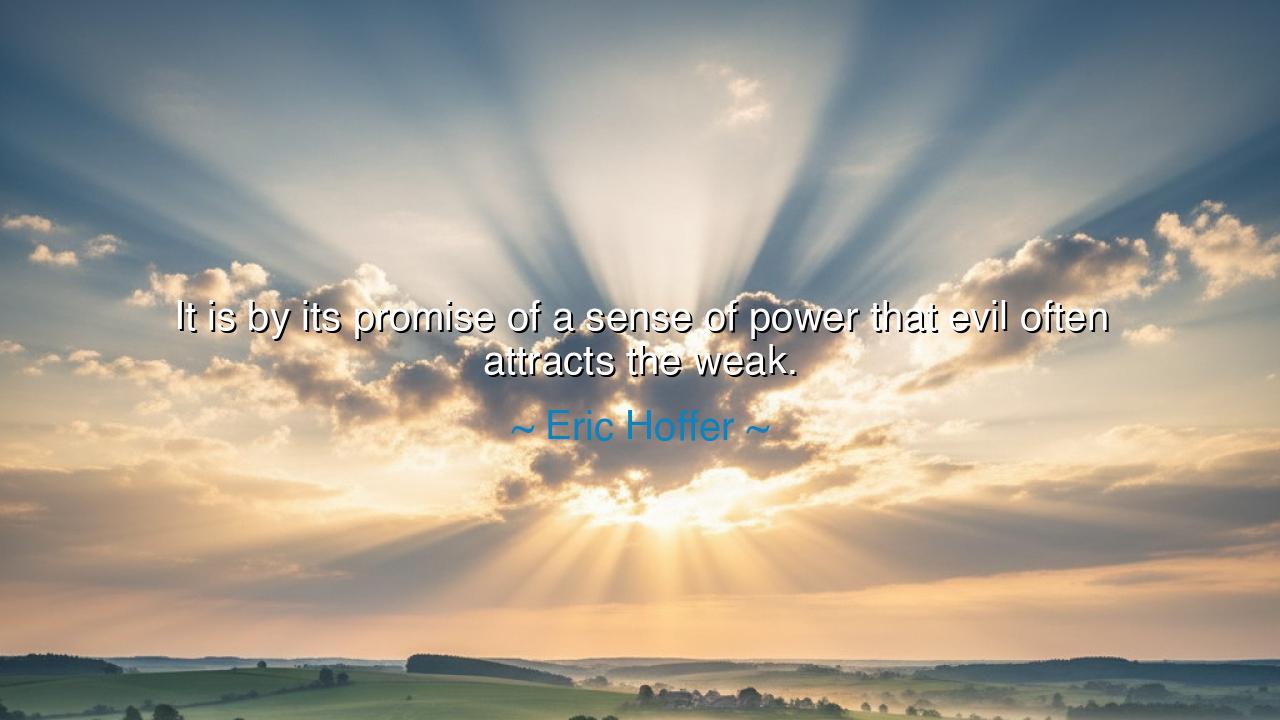
It is by its promise of a sense of power that evil often






In this profound and haunting reflection, Eric Hoffer unveils the dark allure of evil. He declares that it is not by sheer cruelty alone that evil seduces, but “by its promise of a sense of power.” This is a truth that pierces the very heart of human frailty. Many who are weak, uncertain, or marginalized are drawn to the illusion of strength, believing that by serving dark causes they can rise above their own insignificance. Thus, evil does not simply conquer through force; it recruits through temptation, offering its followers a taste of greatness that is hollow and destructive.
The weak in this context are not merely those lacking physical strength, but those whose spirits are burdened by fear, resentment, or despair. Such souls, wounded by life, often yearn for control over their circumstances. Evil, cunning and patient, whispers to them promises of empowerment — “Follow me, and you shall never be powerless again.” Yet this promise is a lie, for in grasping at the shadow of power, they surrender their true selves, becoming tools of destruction rather than masters of their destiny.
History bears grim witness to this pattern. In Nazi Germany, countless ordinary citizens were swept into the machinery of tyranny, seduced by the regime’s promise of restored pride and supremacy. Many who felt humiliated by poverty or war believed they were rising to greatness, when in truth they were being used to carry out unspeakable horrors. Their newfound “power” was but a mask concealing their deeper enslavement. This serves as a stark reminder that evil often wears the guise of liberation, deceiving the vulnerable into becoming its fiercest servants.
Hoffer’s insight also speaks to the subtler forms of corruption in everyday life. A corrupt leader, a gang, or even a toxic relationship can wield the same weapon: the promise of significance. When a person feels unseen or voiceless, the chance to be part of something “greater,” even if destructive, can be intoxicating. This is why vigilance and inner strength are vital, for only those who know their true worth can resist the false allure of evil’s promises.
Thus, this teaching must be passed to future generations: true power does not come from domination, but from self-mastery and virtue. Evil’s promises are like mirages in the desert — dazzling from afar, but deadly when reached. Those who are strong in spirit will see through its illusions and refuse its call, while those who are weak must be guided and uplifted, so they do not fall prey to its seduction. For in the end, evil feeds on weakness, but righteousness nourishes the soul with a power that is eternal and incorruptible.






AAdministratorAdministrator
Welcome, honored guests. Please leave a comment, we will respond soon